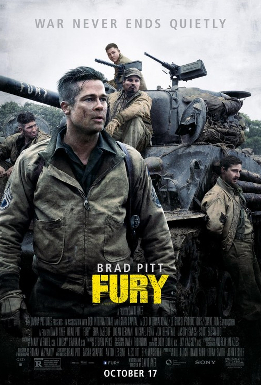Set in 1945, during the final days of World War II, David Ayer's Fury tells the story of Wardaddy, an Army sergeant and commander of a Sherman tank who leads his five-man crew on a dangerous mission behind enemy lines.
Often pushed as the next great war film, Fury is coming in with a world of buzz and high expectations. In several aspects, it delivers on such large promises, giving audience members a semi-authentic and at times comedic look at the realities of war. But more often than not, the film falters, becoming a victim of itself as it attempts to be too many things, ultimately loosing its focus and giving us stereotypical and cliché scenarios that, without the language, could easily serves as an NBC special.
Brad Pitt, who I realized helped get this film made, is terribly cast as Wardaddy, the crew's rough and unemotional leader. Shia LaBeouf also appears out of place, unable to shed his personality and adapt to that of his character Boyd "Bible" Swan. His delivery is inconsistent, as is his humor, making you question whether the changes are a deliberate metaphor of the mental effects of war or simply the work of an actor who isn't quite in touch with his character. Michael Peña and Jason Isaacs breathe some much needed life into the film's core cast, but neither offer us as strong a performance as Logan Lerman.
The most "˜unknown' actor amongst the bunch, Lerman makes the most of his opportunity, fully committing to his portrayal of a young, unknowing soldier who has just been stripped of his desk job where he learned to type so many words per minute and been put on the front lines. His innocence, naivety and overall lack of war knowledge help to drive home just how traumatic war can be. HIs growth throughout the film is one of admiration as we see a boy develop into a man, uncovering the value and importance of brotherhood. He single-handedly saves the film from being a total cliché, giving it a faint pulse to keep us from dozing off midway through.
Structurally Fury is broken up in to three fairly distinct parts. The most interesting is the second. Characters have been introduced, and the story itself is beginning to come into view. We get to see the human side of each of our crew members as they enjoy an afternoon "˜off' after successfully taking over a city. Character interactions bring tensions to a high, giving audiences their first instance of uncertainty. A breakfast scene involving both the crew and a pair of women is easily the best in the film. Without it, I'm not quite sure I would have cared as to the fate of each of our men.
While the final act is unquestionably a salute to Tarantino's no-holds-bar style, Ayer is unable to match his unique ability to seamlessly intertwine violence, humor and wit while still telling a relatable story. Within the last half hour, Fury forces us to question whether it is a film about the horrors of war and the patriotic men who fight for freedom or a piece that uses war as a means of pure entertainment. The final answer is still a question I haven't quite figured out yet, and that, in and of itself, let's me know that the film doesn't have the finesse required to pull off such subject matter.

